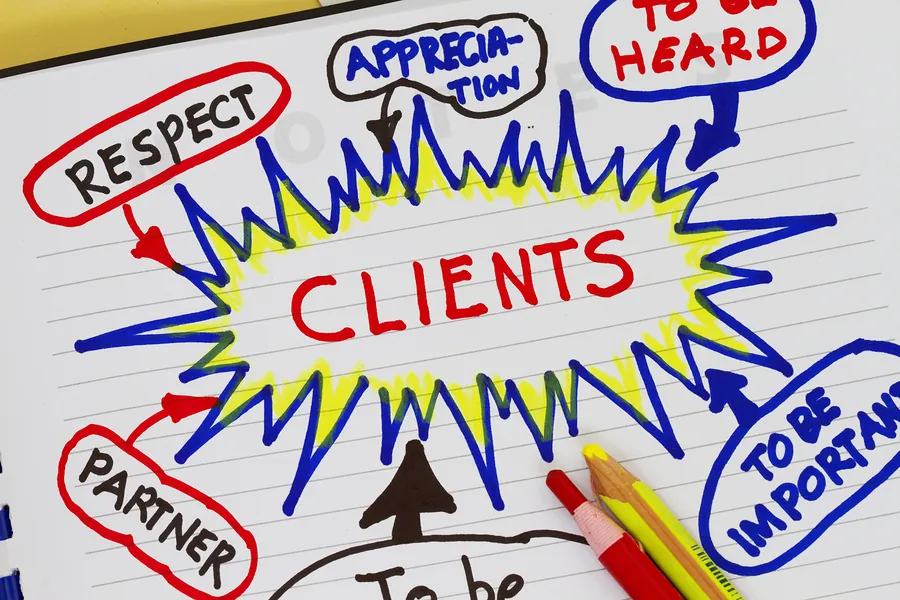Salesperson or Trusted Advisor: What’s the Difference?

“We have the best product in the industry, beat the competition’s price, and we still lost the business.” This is a gripe we hear from even the most experienced salespeople. In the modern sales environment, the best product does not always win. And the lowest price does not always get the deal done. What trumps price in competitive sales? One word. Trust. It has become the most overused word in sales and the least applied in real-world practice. In this article, we break down trust and help you begin your transition from a salesperson to a trusted advisor.
How Important is Trust for Modern Sales
Put yourself in the buyer’s shoes for a second. Imagine you are the VP of Marketing and your company has allocated a budget to upgrade its website. What are you worried about most? The budget has been allocated and it’s not your money, so that removes most of the pressure on the price question. The consequence of a bad decision could cost the company time and future revenue. It would also affect your standing within the organization. In other words, you’re worried about your prestige as much as the SEO and conversion rates. After dozens of presentations, do you pick the company with the lowest price or the highest perceived likelihood of achieving your objectives?
If you are selling on price, you’ve positioned yourself as a transactional salesperson. You will lose more deals than you’ll win if it is a complex sale with consequences for a bad decision. The problem with being a transactional salesperson is that your job is being replaced by ecommerce and checkout carts. If the buyer can obtain all the info they need from Google and make an informed decision with a high likelihood that they will receive what they’re buying, companies will figure out that they won’t need high priced salespeople.
For example, if you have purchased a vehicle from Telsa, Carvana, or Vroom, you ordered it right from their website. Vehicles are the second largest purchase consumers will ever make, besides their home. If salespeople can be removed from vehicle transactions, it is only a matter of time until other transactional sales remove the salesperson as well. Add to the equation the coming A.I. revolution and traditional salespeople are going the way of the video store clerk. Gone.
But it’s not all doom and gloom for sales professionals. In fact, for the highly skilled, the opportunities are limitless. Why? Because many sales interactions are becoming more complex, not less. While anyone can literally research any topic on the internet, it often doesn’t tell them how a solution will alleviate their problem. In addition, there is a lot of contradicting information online that can make a purchase decision even more daunting. Salespeople who possess intricate knowledge of their products and services and can relate to how their widgets will benefit a customers’ need, provide solutions. Success in modern selling rests on a salesperson’s ability to earn the trust and confidence of the prospect, and that their solution will be the best choice for this unique situation.
Build Trust or Suffer Slow Sales
Trust is not some esoteric concept that was invented with Web 3.0. Trust is a human instinct we all developed as infants. Without trust, we would either be constantly evaluating every option or making no decision at all. In other words, paralysis by analysis. It happens often in sales. Have you ever provided all the data, specs, and information to a prospect and they still could not make a decision? Don’t blame the prospect, blame yourself because you may have done everything right except develop trust. For example, have you ever completed a sales call or presentation and your prospect said, “Whoa, you have given me a lot to think about, let me get back to you”? We can overload a prospect with too much information, at the expense of building trust, which results in no-decision. Our job as trusted advisors is to help our clients make the best decision. Remember, it is nearly impossible for a buyer to complete a transaction without trust. When trust is lacking, the default is no decision. Therefore, if you want to increase your sales performance, focus on building trust with your prospects.
Salespeople Think They are Trustworthy
Have you ever met a salesperson who said they were untrustworthy? No, neither have I. The fact is, as salespeople, we like to think of ourselves as trustworthy. But in sales, a better question is, “Have you ever turned down a sale because it would not help the prospect?” If not, ask yourself what your priority was — your commission or your client’s best interest? Building trust requires actions that are trustworthy.
Trust isn’t something you can put on your LinkedIn bio and it’s not something you ask for in sales. Trust is given, gained, and earned. Consider this: Have you ever had a salesperson you just met say, “Trust me,” who then went straight into their sales pitch? If you are like me, you cringed like you heard fingernails on a chalkboard. Trust is not asked for and developed with a statement. When it is, the effect is exactly the opposite. If you want to become a trusted advisor, let your actions do the talking. Then allow your happy clients to do the talking for you.
Are You a Trusted Advisor or a Salesperson?
What is the best way to measure if your clients and prospects trust you? Simple, they will accept your recommendations, give you repeat business and even referrals. You know you’ve gained your clients’ trust when they continue to go with your recommendations and refer business to you consistently. Think of trust as your lubricant for future sales. When clients trust you, they will purchase faster and more often. The economics of repeat business and referrals is the fastest way to grow sales. When they don’t trust you, most of your sales are one-and-done deals. In this scenario, you are always looking for your next prospect. It’s not the easiest way to scale, yet something many salespeople struggle with without knowing why.
Another way to measure if you are a trusted advisor to your clients is the amount of information they share with you. For example, all clients are being solicited by competitors every day. When clients or prospects share what the competition is saying, it can be an indication that they trust you. Trust is not a one-way street. When it is given, then it can be gained. It’s the Law of Reciprocity. Let’s say you share with a prospect how one of your clients is using your solution to solve a problem the prospect didn’t know they had. You provided a new solution, and in return, your client will feel comfortable sharing information with you. You can start with a small act of trust that encourages reciprocity and build-up.
Becoming a Trusted Advisor
Prospects, in general, will have an unconscious bias against salespeople, so trust is not gained with a PowerPoint or White paper. To gain trust, you need to be hyper-vigilant about doing all the things you say you are going to do. Returning emails and voicemails may seem insignificant, but it’s important to follow best practices. For example, starting an email or returning a call with an excuse, such as “Sorry it took me so long to get back to you, I was…” is not something a trusted advisor would do.
What trusted advisors will do is name it and claim it. They are not in the excuses game and have no problem saying, “That was my fault.” Admitting faults is hard, which is why salespeople avoid it. But prospects and clients will care less about your mistake and more about how you handle it. If you own the mistakes you make, your counterpart will see you as vulnerable and human. For example, if you provided the wrong price, you could say, “This is awkward and I feel embarrassed to tell you this, but I quoted the wrong price.” Salespeople will do the opposite. They won’t mention it and hope it won’t be noticed.
In Conclusion
Zig Ziglar said, “Every sale has five basic obstacles: no need, no money, no hurry, no desire, no trust.” If you want to elevate your sales career, start viewing yourself as a trusted advisor. Becoming a trusted advisor is not something you become from reading one blog post. Trusted advisors don’t view themselves as salespeople and they don’t view their work as a job. Trusted advisors view their work more as a calling and feel an emotional connection to what they do. They are guided by a sense of purpose not the chase of a commission. If you are currently in sales and questioning if it’s worth the effort to elevate your status to that of a trusted advisor, ask yourself this single question: “How much would your sales grow if you gained the trust of every prospect and client?”

- Account Planning (11)
- Awards (50)
- Client Testimonial (37)
- Personal Branding (19)
- Podcast (11)
- Research (68)
- Sales Career Development (85)
- Sales Coaching (154)
- Sales Consulting (133)
- Sales Culture (164)
- Sales Enablement (340)
- Sales Leadership (108)
- Sales Management (242)
- Sales Negotiation (16)
- Sales Prospecting (124)
- Sales Role-Playing (18)
- Sales Training (229)
- Selling Strategies (255)
- Soft Skills (67)
- Talent Management (92)
- Trusted Advisor (27)
- Virtual Selling (41)
- Webinar (10)





























